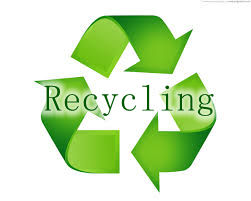 For thousands of years, copper and copper alloys have been recycled. This has been a normal economic practice, even if regretted by some. According to the Copper Development Association, copper's recycling rate is higher than that of any other engineering metals.
For thousands of years, copper and copper alloys have been recycled. This has been a normal economic practice, even if regretted by some. According to the Copper Development Association, copper's recycling rate is higher than that of any other engineering metals.- Copper recycling and reuse
- Reuse: goods such as mobile phones, washing machines and cookers, which are still in working order, can be passed on to others for reuse.
- Recycling: copper containing waste such as WEEE (Waste Electrical and Electronic Equipment), electrical cables, old taps, copper plumbing pipes and scrap from copper/copper alloy production and manufacturing is collected, dismantled and sorted. This is followed by melting, casting and the manufacture of new copper products.
- In Europe, 41% of our demand for copper is met from recycling. Every year in the United States, nearly as much copper is recycled as is mined. Excluding wire production, almost 75 percent of U.S. copper used comes from recycled copper scrap. There are so many advantages to recycling copper that the value of scrap is approximately 85 to 95 percent the price of newly mined ore.
- The entire economy of the copper and copper alloy industry is dependent on the economic recycling of any surplus products. There is a wide range of copper based materials made for a large variety of applications. To use the most suitable and cheapest feedstock for making components gives the most economic cost price for the material.
- Benefits of recycling copper
- The economic and environmental benefits of recycling copper are given below and illustrate the sustainable nature of copper:
- Environment
- During mining and refining (purification) of copper, dust and waste gases such as sulphur dioxide are produced which may have a harmful effect on the environment. Although these harmful effects are minimised by copper producers (sulphur dioxide is captured and used to make sulphuric acid), with recycling there are little, if any, harmful gases emitted.
- Landfill costs
- Copper and copper alloy objects which are not recycled might otherwise be dumped in holes in the ground - this is called landfill. These holes are rapidly being filled up and, as they become scarcer, landfill becomes a very expensive option for waste disposal (of any material)
- Energy saving
- In order to extract copper from copper ore the energy required is approximately 100GJ/tonne. Recycling copper uses much less energy, about 10GJ/tonne, that's only 10% of the energy needed for extraction. This energy saving leads to the conservation of valuable reserves of oil, gas or coal and reduces the amount of CO2 released into the atmosphere.
- Conservation of copper ore
- To date only about 12% of known copper resources have been mined. However copper ore is a finite resource and it makes sense to conserve ore by recycling.
- Economics
- It is cheaper to recycle old copper than to mine and extract new copper. Recycled copper is worth up to 90% of the cost of the original copper. Recycling helps to keep the cost of copper products down.
- Source: The Advantages of Recycling Copper-eHow; Recycling of Copper--Copper Development Association Inc.; Copper recycling and sustainability
-
About us
Contact us
Make a suggestion
- Metalpedia is a non-profit website, aiming to broaden metal knowledge and provide extensive reference database to users. It provides users reliable information and knowledge to the greatest extent. If there is any copyright violation, please notify us through our contact details to delete such infringement content promptly.
 For thousands of years, copper and copper alloys have been recycled. This has been a normal economic practice, even if regretted by some. According to the Copper Development Association, copper's recycling rate is higher than that of any other engineering metals.
For thousands of years, copper and copper alloys have been recycled. This has been a normal economic practice, even if regretted by some. According to the Copper Development Association, copper's recycling rate is higher than that of any other engineering metals.